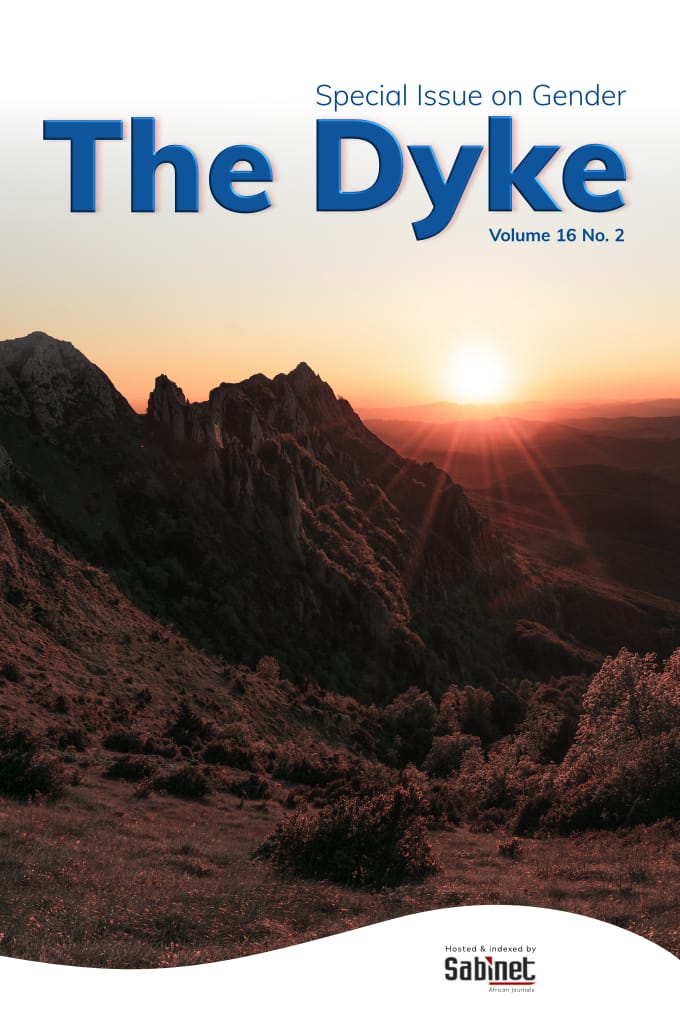The prevalence of sexual harassment in institutions of higher learning in Zimbabwe in the twenty-first century: Perceptions from students and lecturers in Zimbabwe State Universities
DOI:
https://doi.org/10.64754/thedyke.v16i2.190Keywords:
sexual harassment, gender issue, feminist theory, gender empowerment, sexual harassment policy.Abstract
Sexual harassment cases are on the increase in Zimbabwean institutions of higher learning. However, very few of them are officially recorded, reported, or made public. Sexual harassment as a gender issue, is of paramount importance as it has to do with human rights, individual dignity, and psychological stability. Yet oral reflections from students indicate the soaring prevalence of sexual harassment and non-attention to the cases or rehabilitation of affected victims. This scenario requires attention, massive research, and strategies to mitigate the prevalence of sexual harassment in institutions of higher learning in order to produce all-round, robust, creative, innovative, and technologically motivated industrial graduates. This paper is of the contention that sexual harassment cases are not only prevalent but are on the increase in Zimbabwean institutions of higher learning, albeit with most of them going unreported or being swept under the carpet so as to protect the integrity, public scrutiny, and image of the institutions involved. The paper argues that male and female students, as well as lecturers, are mostly perpetrators, victims, or both of sexual harassment. The paper maintains that sexual harassment as a gender issue, is rooted in the feminist theory of gender inequality. This study is grounded in the radical and socialist feminist theories of gender inequality. The study comprised 114 students, 4 Executive Deans of students, 4 Counsellors, and 20 lecturers. The research method used was both qualitative and quantitative. The research findings revealed that sexual harassment is prevalent in Zimbabwean institutions of higher learning and that very few cases are formally reported, recorded, and made public. The study recommends that institutions of higher learning need to put in place and implement sexual harassment policies. Reporting structures must be communicated to all stakeholders and punitive measures, guidance, and counseling be availed to reduce sexual harassment issues.
References
Areguin, M, A. and Cortina, L, M. 2021. Putting people down and pushing them out: sexual harassment in the workplace. Annual Review of Organizational Psychology and Organizational Behaviour, 8: 285-309.
Bellis, A. L. 2021. Sexual Violence in the Context of Higher Education: The Current State of Research and Policy, Handbook of Interpersonal Violence and Abuse Across the Lifespan, 10.1007/978-3-319-89999-2_218, (4061-4082).
Best, J. W. and Khan, J. V. 1993. Research in education. London: Allyn Bacon.
Best, S. 2007. Social theory. London: Sage Publications.
Bob Marley (1980). Redemption Song. Uprising Album
Bryson, V. 1999. Feminist debates. Issues of theory and political practice. New York:
Palgrave and MacMillan.
Bryson, V. 2003. Feminist political theory. New York: Palgrave and MacMillan.
Buju Banton 1997. Destiny. Inna Heights Album
Chauraya, E. and Mugodzwa, T. T. 2015. Understanding gender. In Mawere, D. Matsa, W. and Chauraya, E. (eds.) Introduction to gender studies: A Student’s guide (p 108). Gweru: Mambo Press.
Cheteni, P, Khamfula, Y. Mah, G. 2019. Gender and Poverty in South African Rural Areas, Cogent Social Sciences, 5:1, DOI: 10.1080/23311886.2019.1586080.
EEOC 1992. Preventing Sexual Harassment. London: BNA Communications
Freire, P. 1990. Pedagogy of the Oppressed. London: Penguin Books.
Friebert, S. Needle, J. Thompkins, J.D, Baker J.N, Cheng Y.I, Wang J, Lyon ME 2020. Intersectionality of gender and poverty on symptom suffering among adolescents with cancer. J Pain Symptom Manage.60(1):227-228.
Haralambos, M. and Holborn, M. 2008. Sociology: Themes and perspectives. London: Routledge.
Jessup- Anger, JE, Lopez, E & Koss M P. 2018. History of sexual violence in higher education. College Of Education Faculty Research and Publications.
McCann, C. R. and Kim, S. (Eds.) 2013. Feminist theory reader. New York: Routledge.
Matope, N. and Mugodzwa, T. T. (2013). Motivations for promiscuous behaviour among some female students in institutions of Higher Learning in Zimbabwe.
Nisak, S. and Sugiharti L. 2020. Gender Inequality and Women Poverty in Indonesia. International Journal of Innovation, Creativity and Change 11(9)375-387, 2020
Rodney, W. 1981. How Europe Underdeveloped Africa. Harare: ZPH.
Smith, W. 1990. Golden fox. London: MacMillan.
Tong, R. 1995. Feminist thought: A comprehensive introduction. London: Routledge.
UBOS 2018. Uganda demographic and health survey. Uganda Bureau of Statistics and ICF, Kampala.
UNHCR (2003). Framework for Durable Solutions for Refugees and Persons of Concern, 16 September 2003. EC/53/SC/INF.3

Downloads
Published
How to Cite
Issue
Section
License
All articles in The Dyke are published under the Creative Commons Attribution 4.0 International License (CC BY 4.0).
Under this licence:
- Others may copy, redistribute, remix, transform, and build upon the work for any purpose, even commercially.
- Appropriate credit must be given to the original author(s) and source (The Dyke), along with a link to the license.
- Any changes made must be indicated.
Full licence details: https://creativecommons.org/licenses/by/4.0/
Archiving and Preservation
The Dyke supports long-term preservation of scholarly work through partnerships with digital repositories and indexing services, including Sabinet African Journals. Authors are also encouraged to deposit a copy of their published article in institutional or subject-specific repositories.




